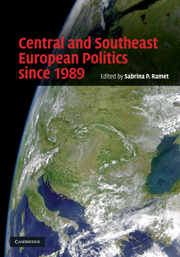Book contents
- Frontmatter
- Contents
- List of figures and maps
- List of tables
- Notes on the contributors
- Preface
- List of acronyms and abbreviations
- Guide to pronunciation of Central and Southeast European words
- 1 Central and Southeastern Europe, 1989
- 2 Central and Southeastern Europe, 2009
- Part 1 Introduction
- Part 2 Issues
- Part 3 Central Europe
- 7 Poland since 1989: muddling through, wall to wall
- 8 Building democratic values in the Czech Republic since 1989
- 9 Slovakia since 1989
- 10 Hungary since 1989
- Part 4 Yugoslav Successor States
- Part 5 Southeastern Europe
- Part 6 Former Soviet republics
- Part 7 Present and future challenges
- Index
- References
9 - Slovakia since 1989
Published online by Cambridge University Press: 05 June 2012
- Frontmatter
- Contents
- List of figures and maps
- List of tables
- Notes on the contributors
- Preface
- List of acronyms and abbreviations
- Guide to pronunciation of Central and Southeast European words
- 1 Central and Southeastern Europe, 1989
- 2 Central and Southeastern Europe, 2009
- Part 1 Introduction
- Part 2 Issues
- Part 3 Central Europe
- 7 Poland since 1989: muddling through, wall to wall
- 8 Building democratic values in the Czech Republic since 1989
- 9 Slovakia since 1989
- 10 Hungary since 1989
- Part 4 Yugoslav Successor States
- Part 5 Southeastern Europe
- Part 6 Former Soviet republics
- Part 7 Present and future challenges
- Index
- References
Summary
Introduction: from nationhood to statehood
The story of post-communist Slovakia tends to be a story of political turmoil, ethnic mobilization, and a cautiously declared success. Slovakia has been a difficult case of post-communist transition, always hovering on the verge of regression to authoritarianism; every election was “critical” to the continuation of democracy, despite the fact that Slovakia managed to enter the EU in the first wave of eastern enlargement in May 2004, after having had only two years to complete the negotiation process. Currently, Slovakia is one of the most successful examples of “Europeanization” both politically and economically and shows impressive levels of foreign investment into the country. The question that begs to be answered, though, is whether the effects of Europeanization are longer lasting than the effects of the communist and pre-communist past, which I have argued elsewhere constitute an accumulation of negative conditions for the process of democratization.
The Slovak national question, 1918–89
Slovakia came into existence on 1 January 1993 as a result of the breakup of Czechoslovakia which split under the pressure of anxiety about the pace of economic transformation on the Slovak side and what in the turmoil of the early post-communism appeared to be an irreconcilable difference in cultural and historical understanding of the common Czechoslovak state from both sides – the Czech and the Slovak. The Czech lands (Bohemia and Moravia) had a markedly different past from Slovakia.
- Type
- Chapter
- Information
- Central and Southeast European Politics since 1989 , pp. 182 - 203Publisher: Cambridge University PressPrint publication year: 2010
References
- 6
- Cited by



